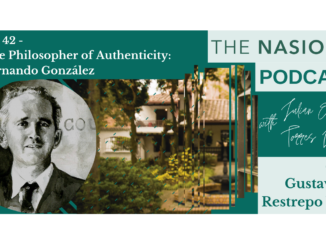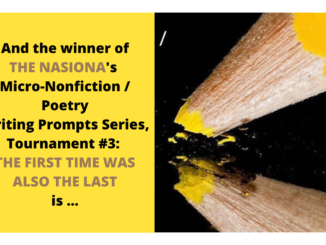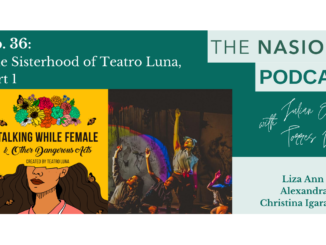
You can also find our podcast episodes on Apple Podcasts, Spotify, iHeartRadio, Stitcher, or wherever you get your podcasts.
 A citizen of the Quechan (Yuma Indian) Nation, Deborah Taffa’s writing can be found at dozens of outlets including PBS, Salon, The Huff Post, Los Angeles Review of Books, Brevity, A Public Space, The Boston Review, and the Best American Nonrequired Reading. Her memoir manuscript won the Santa Fe Writers Project Literary Award in December, 2019. She teaches creative writing at Webster and Washington University in Saint Louis, MO, and lives on the island of O’ahu.
A citizen of the Quechan (Yuma Indian) Nation, Deborah Taffa’s writing can be found at dozens of outlets including PBS, Salon, The Huff Post, Los Angeles Review of Books, Brevity, A Public Space, The Boston Review, and the Best American Nonrequired Reading. Her memoir manuscript won the Santa Fe Writers Project Literary Award in December, 2019. She teaches creative writing at Webster and Washington University in Saint Louis, MO, and lives on the island of O’ahu.
Today’s episode is broken up into two acts where Deborah Taffa shares with us two of her personal essays: “Moon of the Disappearing Water” originally published in The Spectacle, and “Rock Maze” originally published in YES Magazine.
In Act 1, Deborah Taffa centers us in relocation, removal, and disorientation. We’ve all experienced the ache of nostalgia, homesickness, and separation in our lifetime. “Moon of the Disappearing Water” tells the story of a Native woman who leaves her ancestral land, permanently, in her late twenties. She lands in St. Louis, Missouri, where a disappearing lake and the confusion of a binational marriage force her to examine the relationship between motherhood and community for the first time.
In Act 2, death comes. How we deal with it has everything to do with the values we learn in our childhood. “Rock Maze” tells the story of a mother’s cancer, and a daughter’s familial connections to the land. As she leaves her mother’s hospital bed for Sedona and Havasupai, the daughter reflects on healing and prayer, her tribal myths, and the injustice of tourism in her homeland.
HOST
Julián Esteban Torres López (he/him/his/él) is a bilingual, Colombia-born cultural worker with Afro-Euro-Indigenous roots. For two decades, Julián has studied systems of oppression and has worked toward humanizing those who have been socially, politically, and geographically excluded from the hierarchies of power by centering, elevating, and amplifying their voices, experiences, and histories. He is the founder of the social justice storytelling organization The Nasiona, where he also hosts and produces The Nasiona Podcast. He’s a Pushcart Prize and Best Small Fictions nominee, a Trilogy Award in Short Fiction finalist, and the author of Marx’s Humanism and Its Limits and Reporting On Colombia. His work appears in PANK Magazine, Into the Void Magazine, The Acentos Review, Burningword Literary Journal, among others. Julián holds a bachelor’s in philosophy and in communication and a master’s in justice studies from the University of New Hampshire and was a Ph.D. candidate at the University of British Columbia Okanagan, where he focused on political science and Latin American studies.
Twitter and Instagram: @je_torres_lopez
The Nasiona Podcast amplifies the voices and experiences of the marginalized, undervalued, overlooked, silenced, and forgotten, as well as gives you a glimpse into Othered worlds. We focus on stories that explore the spectrum of human experiences—stories based on facts, truth-seeking, human concerns, real events, and real people, with a personal touch. From liminal lives to the marginalized, and everything in between, we believe that the subjective can offer its own reality and reveal truths some facts can’t discover. Hosted, edited, and produced by Julián Esteban Torres López.
Please follow The Nasiona on Twitter, Instagram, and Facebook for regular updates: @TheNasiona
Original music for The Nasiona Podcast was produced by the Grammy Award-winning team of Joe Sparkman and Marcus Allen, aka The Heavyweights.
Joe Sparkman: Twitter + Instagram. Marcus Allen: Twitter + Instagram.The Nasiona Magazine and Podcast depend on voluntary contributions from readers and listeners like you. We hope the value of our work to our community is worth your patronage. If you like what we do, please show this by liking, rating, and reviewing us; buying or recommending our books; and by financially supporting our work either through The Nasiona’s Patreon page or through Julián Esteban Torres López‘s Ko-fi donation platform. Every little bit helps.
Thank you for listening and reading, and thank you for your support.



